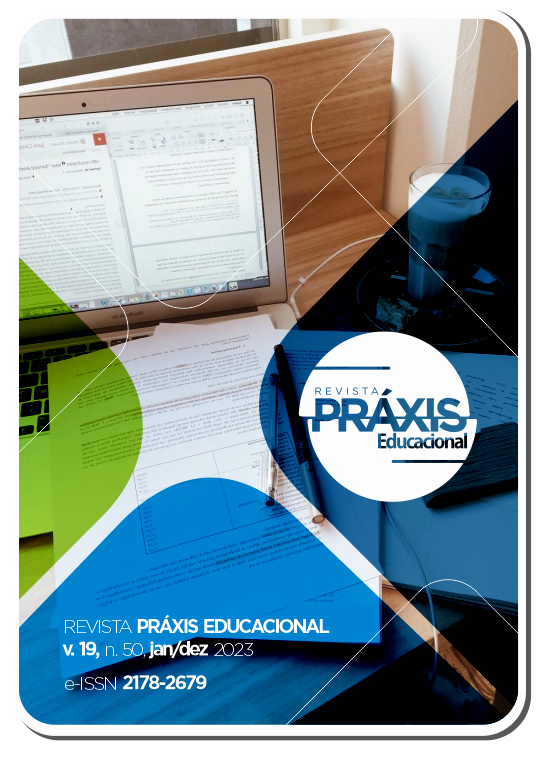Community-intersubjectivity and liberating education: conscientization in the critical-symmetric community
DOI:
https://doi.org/10.22481/praxisedu.v19i50.12050Keywords:
ethical-critical process, conscientization, critical discursive reason, dialogical education, liberation ethicsAbstract
This article deals with the ethical-critical development of the new socio-historical subjects in relation to the exercise of critical discursive rationality. It constitutes, in its origin, part of the Doctoral Thesis in Education and Contemporaneity, a study of a theoretical nature, with a qualitative approach and bibliographic procedure, developed from the hermeneutic perspective of Enrique Dussel's transmodern pedagogy. Thus, in relation to its partial aspect (in relation to the totality of the research from which it proceeds), it takes Dusselian ethics and Freirean pedagogy as a theoretical reference, from which it seeks, in the Freirean paradigm of liberating education, a practical reference for the ethical-critical rational development, as an intersubjective-community experience of ethical-subjects denied as oppressed/victims. To this end, it works with the key concepts of “ethical-critical process” and “conscientization”; “critical discursive rationality” and “dialogicity”; “community intersubjectivity”; and “critical-symmetric community”.
Downloads
Metrics
References
ANJOS, José Edemilson Pereira dos. Para uma racionalidade ético-crítica da vida: a formação do sujeito da práxis de libertação. 2021. 225 f. Tese (Doutorado em Educação e Contemporaneidade) – Departamento de Educação/Campus 1, Programa de Pós-Graduação em Educação e Contemporaneidade, Universidade do Estado da Bahia, Salvador, 2021.
DUSSEL, Enrique. Filosofia da Libertação. Tradução: Luiz João Gaio. 2. ed. São Paulo: Loyola; Piracicaba: UNIMEP, 1977a. (Coleção Reflexão Latino-americana, vol. 3: Filosofia na América Latina, tomo I).
DUSSEL, Enrique. Para uma Ética da Libertação Latino-americana. Tradução: Luiz João Gaio. São Paulo: Loyola; Piracicaba: UNIMEP, 1977b. (Coleção Reflexão Latino-americana, Erótica e Pedagógica, vol. 2, tomo III).
DUSSEL, Enrique. Ética de la liberación (hacia el “punto de partida” como ejercício de la “razón ética originária”). In: SIDEKUM, Antonio (org.). Ética do Discurso e Filosofia da Libertação: modelos complementares. São Leopoldo: Editora UNISINOS, 1994, p. 145-170.
DUSSEL, Enrique. La ética de la liberación ante el desafio de Apel, Taylor y Vattimo. Ediciones de la Universidad Autónoma del Estado de México: Cidade do México, 1998.
DUSSEL, Enrique. Ética da libertação: na idade da globalização e da exclusão. Tradução de Ephraim Ferreira Alves; Jaime A. Clasen; Lúcia M.E. Orth. 4. ed. Petrópolis: Editora Vozes, 2012. (2. reimpressão, 2018).
DUSSEL, Enrique. 14 tesís de ética. Hacia la esencia del pensamiento crítico. Madri: Editorial Trotta, 2016. (Colección Estructuras y Procesos. Série Filosofía).
FREIRE, Paulo. Educação como prática da liberdade. 7. ed. Rio de Janeiro: Paz e Terra, 1977.
FREIRE, Paulo. Pedagogia do oprimido. 5. ed. Rio de Janeiro: Paz e Terra, 1978. (Coleção O mundo, hoje, v. 21).
FREIRE, Paulo. Conscientização. Teoria e prática da libertação: uma introdução ao pensamento de Paulo Freire. São Paulo: Cortez e Moraes, 1980.
FREIRE, Paulo. Ação cultural para a liberdade. E outros escritos. São Paulo: Paz e Terra, 2010. (Coleção O mundo, hoje, v. 10).
FREIRE, Paulo; NOGUEIRA, Adriano. Que fazer: teoria e prática em educação popular. 11. ed. Petrópolis: Vozes, 2011.
Downloads
Published
How to Cite
Issue
Section
License
Copyright (c) 2023 Práxis Educacional

This work is licensed under a Creative Commons Attribution-ShareAlike 4.0 International License.
You are free to:
Share - copy and redistribute the material in any medium or format; Adapt - remix, transform, and build from the material for any purpose, even commercially. This license is acceptable for Free Cultural Works. The licensor cannot revoke these freedoms as long as you follow the terms of the license.
Under the following terms:
Attribution - You must appropriately give credit, provide a link to the license, and indicate if any changes have been made. You may do so in any reasonable way, but not in a way that suggests that you or your use is endorsed by the licensor.
There are no additional restrictions - You cannot apply legal terms or technological measures that legally restrict others to make any use permitted by the license.










